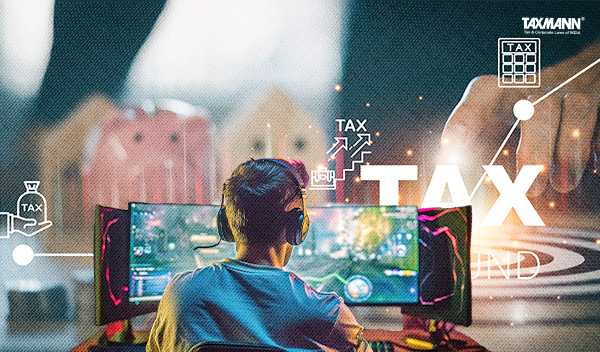[Opinion] Game of Tax – Direct and Indirect Tax Nuances for the Gaming Industry
- Blog|News|Income Tax|
- 3 Min Read
- By Taxmann
- |
- Last Updated on 14 June, 2024

CA Parag Rathi & CA Abhishek Anand – [2024] 163 taxmann.com 365 (Article)
1. Background on the Gaming Industry
Online gaming is the new virtual playground not only for the youth but for people of all ages who wish to challenge their skills and/or chance/luck while playing these games.
Recently an event “Game on ft. NaMo” served as a platform to engage with the top Indian gamers with objective to understand the industry and its scope in India. The countries technological development, surge in startup culture, ratio of young population and the versatile creative minds collectively pave the way for flourishing the growth of industry.
That said, the Gaming Industry has been experiencing turbulence due to the uncertainty around taxing statutes. This intensely impacts the investor sentiments and brings alive the memories of similar controversy around the retrospective taxation on indirect transfers alias the Vodafone Case!
2. Integrated
There was a time in the Indian tax and regulatory sphere where taxpayers would successfully tell two completely different stories with respect to their business operations to the Income Tax Department and the Service Tax Department – and it worked too as these two giant whales did not communicate well with each other. But today’s story is quite different. In July 2020, Central Board of Direct Taxes and the Central Board of Indirect Taxes and Customs have signed a Memorandum for effective data exchange.
This has created the need for an integrated approach for taxpayers i.e., the exact same story needs to be told to the Income Tax Officer and the Goods and Services Tax Officer – else there will be trouble in paradise. Hence, the taxpayer’s Direct Tax team and the Indirect Tax team – who have been working in silos over the years – need to efficiently communicate with each other.
This also creates the need for integration among advisors – even the advisors/ consulting firms cannot operate in silos. Also, the middle level and top level management at consulting firms need to have a basic understanding of both Direct as well as Indirect Tax – so as to ensure that solutions which work for one law do not jeopardise positions under the other law.
3. Indirect Tax Issues
3.1 Controversy under GST Law
Majority of the developed countries across the world, have adopted Gross Gaming Revenue (GGR) model for the taxing statues. Some of the countries who have adopted the Contest Entry Amount (CEA) model are also fast moving to GGR model given the withdrawal of many online gaming operators from their market due to the higher tax obligations. India on the other side seems to have picked the inverse trend being cautious of its impact and responded with the harsh taxation laws.
Let us consider the taxing trends other evolving industries viz. investments/stock markets, banks/NBFC offerings. GST is charged on the commission or brokerage charged by the Brokers or the Trading Platform, being the real income and not on the total amount paid or deposited with them or earned by customers by trading or depositing.
In case of banking industry as well, the similar analogy can be observed. GST is charged on the bank charges, commission or brokerage charged by the bank from customers representing their actual income rather than the amount deposited by the customer in the bank.
Similarly in gaming industry, the real income of the platforms is the platform fee, service charges, or the net income earned. Considering the business operations across various industries and the taxation pattern observed, it becomes evident that taxing Gross Gaming Revenue (GGR) exclusively, rather than the entire deposit amount, stands as the prevailing industry norm.
4. Direct Tax Issues
4.1 Accounting and Computing Profits
Even though the Government has decided to levy GST on the entire amount collected from customers, the fact remains that Gaming companies do not account the entire amount collected from customers as revenue. The Gaming companies, in most cases, end up recognizing the platform fee and other charges levied as revenue in the books of account. Ordinarily, this position would remain so both under the traditional Accounting Standard (AS 9) and the Indian Accounting Standards (based on IFRS) (Ind AS 18), subject to business models and terms of the agreement with customers.
The rest of the amount so collected from customers will not pass through the Profit and Loss account but would be a part of the Balance Sheet as Gaming companies would be considered an agent of the customer for the money they spend on playing games with other customers – subject to the business models and terms of the agreement with customers.
Thus, there would be a huge difference between the turnover of Gaming companies as per GST returns and books of account.
Click Here To Read The Full Article
Disclaimer: The content/information published on the website is only for general information of the user and shall not be construed as legal advice. While the Taxmann has exercised reasonable efforts to ensure the veracity of information/content published, Taxmann shall be under no liability in any manner whatsoever for incorrect information, if any.



 CA | CS | CMA
CA | CS | CMA
